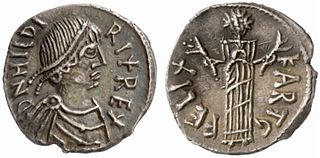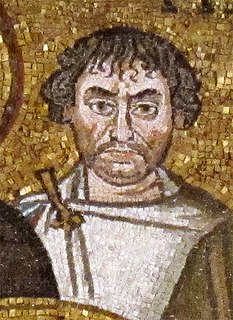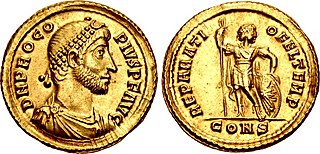
Justinian I, also known as Justinian the Great, was the Eastern Roman emperor from 527 to 565.
Procopius of Caesarea was a prominent late antique Byzantine scholar from Palaestina Prima. Accompanying the Byzantine general Belisarius in Emperor Justinian's wars, Procopius became the principal Byzantine historian of the 6th century, writing the History of the Wars, the Buildings, and the Secret History. He is commonly classified as the last major historian of the ancient Western world.

Flavius Valens was Roman emperor from 364 to 378. He was the younger brother of the emperor Valentinian I, who gave Valens the eastern half of the Roman Empire to rule. Before 364, Valens had a largely unremarkable military career. In 378, Valens was defeated and killed at the Battle of Adrianople against the invading Goths, which astonished contemporaries and marked the beginning of barbarian encroachment into Roman territory.

The Heruli were an early Germanic people. Possibly originating in Scandinavia, the Heruli are first mentioned by Roman authors as one of several "Scythian" groups raiding Roman provinces in the Balkans and Aegean, attacking by land, and notably also by sea. During this time they reportedly lived near the Sea of Azov.

Hilderic was the penultimate king of the Vandals and Alans in North Africa in Late Antiquity (523–530). Although dead by the time the Vandal kingdom was overthrown in 534, he nevertheless played a key role in that event.

Narses was, with Belisarius, one of the great generals in the service of the Byzantine Emperor Justinian I during the Roman reconquest that took place during Justinian's reign. Narses was a Romanized Armenian. He spent most of his life as an important eunuch in the palace of the emperors in Constantinople.
In atomic physics, the Bohr magneton is a physical constant and the natural unit for expressing the magnetic moment of an electron caused by either its orbital or spin angular momentum. The Bohr magneton is defined in SI units by

Procopius was a Roman usurper against Valens, and a member of the Constantinian dynasty.

Corinnidae is a family of araneomorph spiders, sometimes called corinnid sac spiders. The family, like other "clubionoid" families, has a confusing taxonomic history. Once it was a part of the large catch-all taxon Clubionidae, now very much smaller. The original members of the family are apparently similar only in that they have eight eyes arranged in two rows, conical anterior spinnerets that touch and are generally wandering predators that build silken retreats, or sacs, usually on plant terminals, between leaves, under bark or under rocks.

Třebíč is a town in the Moravian part of the Vysočina Region of the Czech Republic. Třebíč is a regional centre with a population of approximately 36,000. It is the administrative capital of the Třebíč District.

Theodora was an Eastern Roman empress by marriage to emperor Justinian. She became empress upon Justinian's accession in 527 and was one of his chief advisers, albeit from humble origins. Along with her spouse, Theodora is a saint in the Eastern Orthodox Church and in the Oriental Orthodox Church, commemorated on 14 November and 28 June respectively.

Dara or Daras was an important East Roman fortress city in northern Mesopotamia on the border with the Sassanid Empire. Because of its great strategic importance, it featured prominently in the Roman-Persian conflicts. The former archbishopric remains a multiple Catholic titular see. Today the Turkish village of Oğuz, Mardin Province, occupies its location.

The Sack ofRome in 546 was carried out by the Gothic king Totila during the Gothic War of 535–554 between the Ostrogoths and the Byzantine Empire. Totila was based at Tivoli and, in pursuit of his quest to reconquer the region of Latium, he moved against Rome. The city endured a siege lasting almost a year before falling to the Goths.

Ștefan Procopiu was a Romanian physicist.

Aedava was a Dacian settlement located south of the Danube in Moesia. In his De Aedificiis, the 6th century AD historian Procopius placed Aedava on the Danubian road between Augustae and Variana. He also mentioned that Emperor Justinian restored the damaged portion of the town defenses.
Procopius, original surname Pelekasis, served as Ecumenical Patriarch of Constantinople during the period 1785-1789.
Procopius is a genus of African corinnid sac spiders first described by Tamerlan Thorell in 1899.

Anthonomus aeneolus is a species of true weevil in the beetle family Curculionidae. It is found in North America.
Dabanas was a fortress in Osroene, inhabited during Roman and Byzantine times. It is mentioned by Procopius and was used by the emperor Justinian I.













